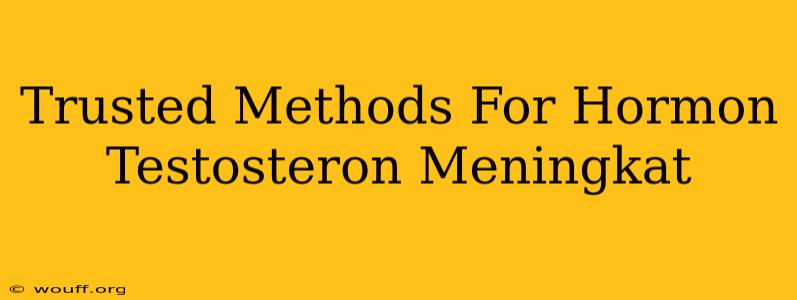Low testosterone can significantly impact your well-being, affecting everything from energy levels and muscle mass to mood and libido. While medication is an option, many men are seeking natural ways to boost their testosterone levels. This article explores trusted and effective methods for naturally increasing your testosterone.
Understand Your Testosterone Levels
Before embarking on any testosterone-boosting strategy, it's crucial to understand your current levels. A simple blood test from your doctor can provide a clear picture. This allows you to track progress and ensures you're not overdoing it with supplements or extreme methods. Ignoring underlying health issues is a critical mistake. Low testosterone can be a symptom of a larger problem, so getting a proper diagnosis is paramount.
Lifestyle Changes: The Cornerstone of Testosterone Optimization
Lifestyle modifications are often the most effective and safest way to increase testosterone naturally. These changes aren't just about quick fixes; they contribute to overall health and well-being.
1. Optimize Your Diet
- Prioritize Protein: Sufficient protein intake is essential for building and repairing tissues, including muscle mass, which positively affects testosterone production. Include lean meats, fish, eggs, and legumes in your diet.
- Healthy Fats are Key: Don't shy away from healthy fats. They are crucial for hormone production. Incorporate sources like avocados, nuts, seeds, and olive oil.
- Limit Processed Foods and Sugar: Processed foods and excessive sugar intake can negatively impact testosterone levels and overall health. Choose whole, unprocessed foods whenever possible.
- Consider Zinc and Magnesium: These essential minerals play a vital role in testosterone production. Ensure you're getting enough through your diet or consider supplementation after consulting your doctor.
2. Prioritize Exercise
- Strength Training is Crucial: Lifting weights stimulates testosterone production. Focus on compound exercises that work multiple muscle groups simultaneously.
- High-Intensity Interval Training (HIIT): HIIT workouts can also effectively boost testosterone levels. These short bursts of intense activity followed by brief rest periods are highly efficient.
- Maintain a Healthy Weight: Obesity is linked to lower testosterone levels. Losing even a small amount of weight can make a significant difference.
3. Improve Sleep Quality
Sleep is critical for hormone regulation. Aim for 7-9 hours of quality sleep per night. Establish a consistent sleep schedule and create a relaxing bedtime routine to optimize your sleep quality. Addressing sleep apnea is critical if you suspect you might have it, as it significantly impacts hormone production.
4. Manage Stress
Chronic stress can negatively impact testosterone production. Incorporate stress-reducing techniques into your daily routine, such as meditation, yoga, or spending time in nature.
Supplements: Proceed with Caution
While some supplements are marketed to boost testosterone, it's crucial to approach them cautiously.
- Consult Your Doctor: Always consult your doctor before starting any new supplements, especially if you're on other medications.
- Research Thoroughly: Not all supplements are created equal. Research the supplement's reputation and ensure it comes from a reputable source.
- Avoid Unproven Claims: Be wary of products making exaggerated claims. Effective testosterone boosting takes time and consistent effort.
When to Seek Medical Attention
If you're experiencing symptoms of low testosterone, such as decreased libido, fatigue, weight gain, or mood changes, and lifestyle changes aren't helping, it's essential to seek medical advice. Your doctor can perform tests to determine your testosterone levels and recommend appropriate treatment options.
Disclaimer: This information is for educational purposes only and should not be considered medical advice. Always consult your doctor before making any changes to your diet, exercise routine, or supplement regimen.

